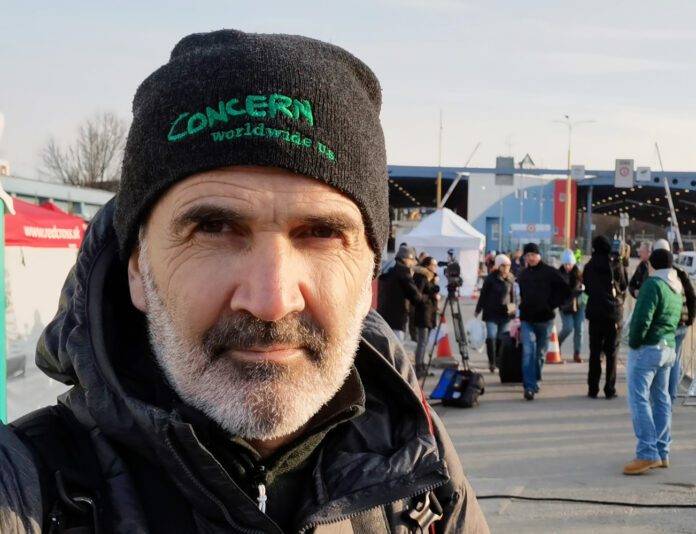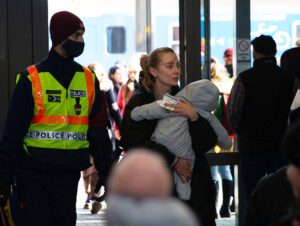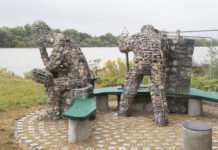
WOMEN and children who flee war-torn Ukraine face additional risks of exploitation by human traffickers, a Limerick-based advisor with aid-agency, Concern, has warned.
Kieran McConville, a former RTE cameraman who is a global content advisor with Concern said: “This will become a problem.”
“There are some reports of unaccompanied children and if they end up on the streets of Europe without any sort of support system, you can imagine how vulnerable they are if they don’t have the means to look after themselves,” McConvillle explained.
With ten years experience working in refugee crisis situations in Afghanistan, Somalia, and South Sudan, McConville said he expects that protecting refugees from additional risks when they leave Ukraine will be a priority.
“A lot of people moving across the border are women and children, and as they move they are going to be very vulnerable because trafficking is a big issue”.
Speaking from Poland where he was preparing to cross into Ukraine, McConville said Concern was to implement a plan of “safeguarding and protection to ensure that vulnerable people don’t fall through the net and become victims of bad people.
“The support here at the moment from governments and local volunteer organisations in terms of giving people somewhere to stay, has been great, but the numbers of refugees might well become overwhelming,” he warned.
“Even in Krakow, there are a lot of people wandering the streets looking for somewhere to stay, trying to find food, that kind of stuff, and they are women and children in an exposed situation, and vulnerable to trafficking and crime,” he said.
Since arriving over a week ago to access Ukraine border crossings, McConville said he has encountered some of the worst human suffering in people crossing from Ukraine into Hungary, Slovakia, and Poland.
“I’ve been meeting and talking to these people at the train stations and border crossings and they saw awful things as they were evacuating. I’ve heard a lot of traumatic stories from people coming from the far east of the country, in the Donbas, who said there were bombs falling around their heads as they were getting out.”
The refugees wait in border queues in freezing temperatures for up to four days and while some have been even lucky to hitch a lift in a warm car or squeeze into packed trains, others must walk there, having left their cities, towns, and villages destroyed by Russian missile strikes.

“The numbers are increasing all of the time. I guess it’s pushing around two million, which is a huge movement of people”.
Despite there being no let up in the war, he and his colleagues have decided to cross into Ukraine to try to help those hit worst by President Putin’s war machine.
“We’ve just finished doing an assessment at the borders and the decision is that the greatest need is probably inside the country, so we are going to move into Ukraine,” he explained.
They will join partner agencies inside Ukraine distributing essential items, like food, as shelter material and hygiene items.
He said he does not know how long he will be inside Ukraine, which is a worrying situation for him and his family back in Limerick.
“Obviously being in an any kind of a war zone or conflict zone is risky, but I think all of the risks Concern take are calculated risks, so I don’t have too many concerns that way,” he explained.
Despite the potential risks, he is determined to carrying on the work, assessing the humanitarian crisis, “taking pictures, and telling people’s stories”.
“For the moment, Western Ukraine is relatively peaceful, most of the action is happening in the East. We will go to Lviv and we will take it from there, it is a sort of transit place where a lot of people are going to try to get away from the East.”
As well as blankets, warm clothes, and children’s buggies, cash donations are also urgently needed for the massive wave of refugees pouring out of Ukraine.
“We are putting together a plan now and it may well be that we will support people with cash, which is often a very useful way to support people in a displacement crisis. Rather than us deciding what it is they need, you give people the means to pay for whatever they need”.
“It sounds very basic but in situations like this, money is the most straight forward way of helping; it gives flexibility to be able to respond to people’s needs on the ground,” he said.
“People have been massively generous, they have been especially moved by this crisis, and the Irish people are always generous, but it is very impressive how generous people have been to date.”
Cash donations can be made online at www.concern.net










